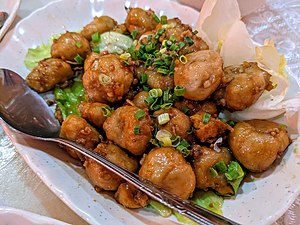 | |
| Type | Main course |
|---|---|
| Place of origin | China |
| Main ingredients | Taro, tapioca flour |
| Abacus seeds | |||||||||||
|---|---|---|---|---|---|---|---|---|---|---|---|
| Traditional Chinese | 算盤子 | ||||||||||
| Simplified Chinese | 算盘子 | ||||||||||
| Literal meaning | "abacus seeds" | ||||||||||
| |||||||||||
Abacus seeds (Chinese: 算盘子) or abacus beads is a Hakka Chinese dish consisting of dimpled, disc-shaped dumplings made with taro and tapioca flour. The dumplings are boiled then stir-fried with minced pork, shiitake or wood ear mushrooms, dried shrimp, dried cuttlefish and firm bean curd.
Due to its association with the abacus and counting money, the dish is eaten during festivals such as Chinese New Year to signify wealth and prosperity.[1][2] The dumplings' round shape is also said to represent reunion and good health.[3]
It can be found in parts of China, Taiwan, Malaysia and Singapore, and in cities with a large Hakka population.[1][3]



